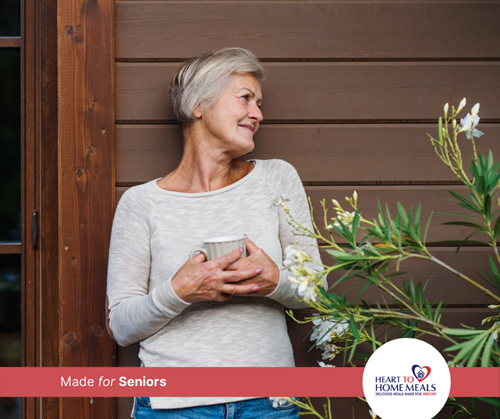
The COVID-19 pandemic has been a scary, lonely time for many people, especially seniors. As a population particularly vulnerable to viruses, those in senior home care settings or aging at home found themselves in lockdown. Not only were seniors advised not to leave their homes for their own protection, but also weren’t able to receive visitors. Sleepovers with grandchildren were postponed. Celebrations with family were put on hold. Fitness centers were closed and other forms of social interaction, like regular card games with friends, were cancelled. Even routine doctor’s appointments went from in-person visits to phone calls.
How can you stave off feelings of loneliness and depression? Leading experts recommend a variety of positive strategies to help you cope with loneliness so you can stay physically and mentally healthy during the pandemic. These include:
- Eat healthy, well-balanced meals. Proper nutrition is a great way to ensure you feel well. Since grocery shopping is extra challenging during the pandemic, make your life easier (and tastier) by using a senior meal delivery service with a wide range of nutritious and satisfying options for every meal of the day. A home delivery meal service saves you time, effort, and ensures all your dietary needs are met.
- Move regularly. Do you enjoy yoga, dancing around or Tai-Chi? Even if your regular in-person fitness classes are cancelled, you can look for new senior exercise classes to join online. If that’s not your speed, mask-up and take a stroll outside. The fresh air and sunshine – and perhaps even the company (from a safe distance, of course) of a walking buddy – will make you feel healthy and connected.
- Get lots of sleep. Stick to a schedule and make sure you’re getting the recommended number of hours of sleep so you can function optimally every day.
- Make time for yourself. Do you enjoy a hot bath? Crafting? Reading? Set aside time for activities you enjoy. Or take up a new hobby. Perhaps you’ve always wanted to try painting or bird watching. Relaxing and taking care of yourself—even if you just listen to music over a cup of herbal tea—will make you feel rejuvenated, no matter what else is happening in the world around you.
- Avoid the media if it becomes overwhelming. The constant stream of negativity and startling statistics can make us feel worried or stressed. Turn off the TV or put down the paper and tune in to a good-news-only channel, watch a documentary or download a podcast instead to feel mentally stimulated and informed.
- Connect with others. Just because you might not feel safe connecting in person doesn’t mean you shouldn’t connect at all. Quite the opposite! Get set up on a computer, tablet or phone. There are lots of great apps that enable you to video call your friends and family. You can also pick up the phone. Catch up with friends. Reminisce. Share your feelings with people you trust. Connecting with people you care about will help you feel loved, cared for and connected.
- Volunteer. Helping others in meaningful ways makes us feel good about ourselves. Why not write letters to friends, make masks for others or send a meal to a friend who’s feeling down? This is a great way to connect with your community and raise other people’ spirits—strangers and friends alike.
- Know the facts. There’s a lot of information and misinformation out there. Understanding the truth will help alleviate stress. Speak to your doctor, even on the phone, to find out the facts. If you’re researching online, use only trusted sources, not social media, for advice and information.
- Join an online community. Maybe there are faith-based groups or crafting groups that have formed networks online, to name but two examples. Speak to friends for recommendations or use a search engine to find groups you can join. Perhaps you will find new people to play cards with online, or even chess or Scrabble. No matter what you enjoy, there’s a group for you online.
- Plan for the future. Sometimes it’s fun to look ahead and think of all the things you’d like to do when the pandemic restrictions lift. Make a list. Soon enough you’ll be checking them off.
Are you still feeling low? Experts advise paying attention to how you’re feeling and to watch for signs of depression. Symptoms can include fear and worry about your health, changes in sleep or eating patterns, difficulty concentrating, and, worsening health, both mental and physical.
----------
If you can identify with this list, it’s time to act. Speak to a trusted loved one or your health-care provider about your feelings. There are also a variety of mental health hotlines and community supports available for seniors. Your doctor can recommend tele-health services or online counselling services to help you through this difficult time.
Do you have questions about senior nutrition? Download our FREE eBook to learn more: Click here to Download NOW!
Dont forget to "Follow" and "Like" us on Facebook


